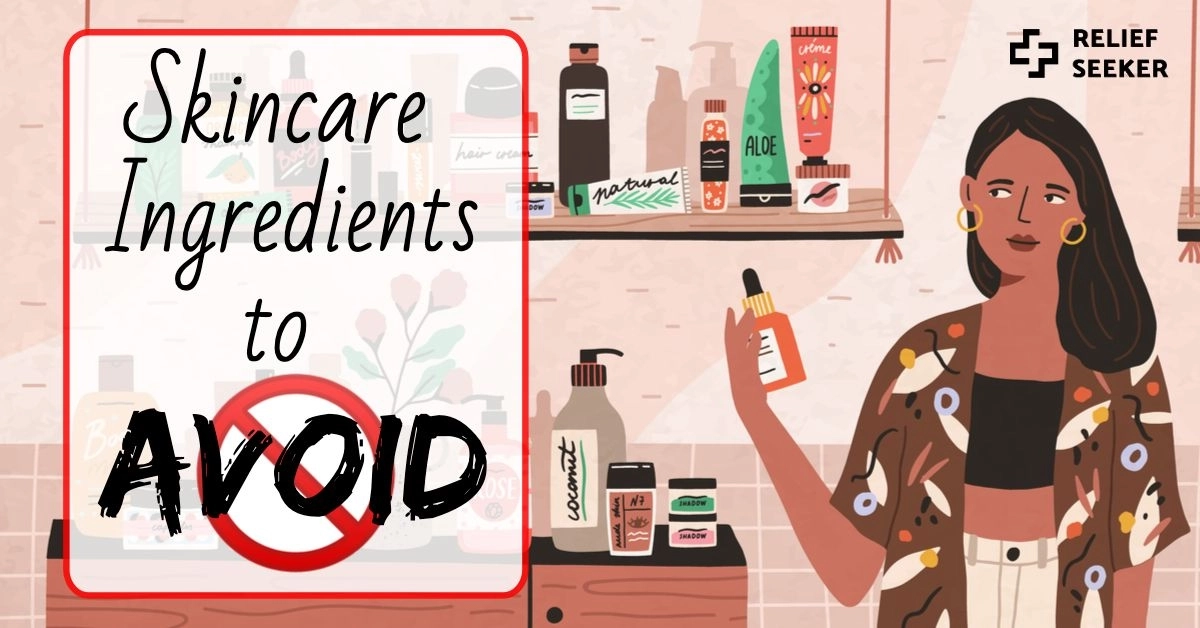There are thousands of skincare products on the market these days. It’s tricky to know which products are ideal for your skin type — never mind which products contain irritants, known carcinogens, and harmful ingredients.
To make matters worse, the skincare industry is notoriously not regulated. Cosmetic ingredients do not need FDA premarket approval (except for color additives).
So, how do you determine the toxicity or safety of a product? You may need to do a little leg work if you want to avoid harsh ingredients, chemicals, and byproducts. Find out the common skincare ingredients to avoid and how to avoid known allergens and irritants — all while keeping your skin glowing and clear.
How to Spot Skincare Ingredients to Avoid
If you’re confused about the ingredients in your skincare products, you’re not alone. Skincare ingredient labels are usually packed with long lists of ingredients you’ve probably never heard of.
To make matters worse, the skincare industry often touts some ingredients as ‘miracle’ products — when in reality, they aren’t ideal for every skin type (or, in some cases, any skin type).
We happen to love prescription skincare products (like Musely and Rory) because they are specially formulated for your skin. Your dermatologist can work with you to tweak the amount of an active ingredient while explaining other ingredients' common side effects.
Yet, if you just need to buy a product at the drugstore (or a department store), there are some easy ways to spot troublesome ingredients.
Read the Labels
We get it: skincare labels are notoriously confusing! Who has time to research all the products listed on a shampoo bottle label? Who can even pronounce half of those ingredients?
One of the easiest ways to stay sane while researching products is to purchase skincare online. You can easily research the ingredients (ingredient lists are usually included in the product’s description) and quickly search product reviews and unknown ingredients — right from your laptop or smartphone.
If you’re opting for prescription skincare, you can simply ask your dermatologist any questions you may have regarding product ingredients, saving you time and a little sanity.
Get to Know the ‘Dirty Dozen’
When it comes to skincare ingredients to avoid, the list is long. Yet, there are 12 common offenders you’ll find in products that you may want to avoid. These ingredients include:
Acrylates
Butylated hydroxyanisole (BHA)/butyl Methoxydibenzoylmethane
Formaldehyde
Methylisothiazolinone
Mineral oil
Oxybenzone
Parabens
Petroleum
Phthalates
Sodium lauryl sulfate
Toluene
Triclosan
Skincare Labels Aren’t Food Labels
One of the main tenets of shopping for healthy foods is never purchasing a food product with ingredients you can’t pronounce.
If only skincare shopping were that easy.
In some cases, you’ll see ingredients on skincare labels that you can pronounce (and even recognize!) that aren’t ideal for your skin (take mineral oil, for example; it sounds harmless — maybe even good for you. Minerals are good, aren’t they?).
You’ll also see ingredient names that are longer than the deed on your car that are actually totally fine for your skin. Instead of worrying about memorizing ‘bad’ ingredients, familiarize yourself with the brands you love.
If you’re anxious about skincare products to avoid, you may want to find a company that specializes in personalized skincare or all-natural ingredients (though, sometimes companies toting all-natural ingredients come with their own risks, too; see below).
Dos and Don’ts of Skin Care
No matter what skincare you purchase, there are a few ‘rules of thumb’ that can help steer you in the right direction when it comes to product ingredients.
Do be minimalist about skincare products by buying skincare sets.
Don’t get stuck with tons of unnecessary skincare products.
Do buy personalized and prescription skincare products.
Don’t get tricked into buying products advertising ‘all-natural’ skincare without checking ingredients.
Do find your favorite products and stick with them.
Don’t get sucked into marketing schemes that make pie-in-the-sky promises.
Do be honest with your dermatologist about your skin.
Don’t lie to get a ‘higher’ prescription for skincare.
Beauty Products Containing Adverse Ingredients
The following skincare products are some of the most common offenders containing ingredients you should avoid:
Anti-aging products
Antibacterial products (DMDM hydantoin)
Body wash
Cleansers
Conditioner
Cosmetic products
Deodorant
Essential oils
Eyeshadows
Face wash
Hair dyes
Lip balms
Lotions
Mascara
Moisturizers
Nail polish
Personal care products
SPF sunscreen
Skincare Products to Use With Caution
Some ingredients should just never be included in skincare products. Manufacturers add them because they increase the shelf-life of the product or reduce production costs.
Yet, there are some products that make their way onto shelves that aren’t necessarily bad when used correctly — or, they’re effective but should be used with caution.
All-Natural Skincare
Skincare companies have jumped on the ‘all-natural’ bandwagon in the past few years. You’ll find product labels covered in words like organic, natural, and healthy. Some of these products do hold up their promises, but some simply use these words to get you to buy their products.
There’s very little regulation around using these words in marketing (especially when it comes to non-food products). You’ll find plenty of products that list plant-based ingredients on the front of the product and a long list of ingredients to avoid on the back label.
It’s also important to remember that just because a product is all-natural doesn’t mean that it’s actually better (or that it’s right for your skin type). Plant-based products can still cause allergic reactions and hormonal disruptions.
Coconut Oil
Coconut oil is an ingredient that has been marketed as a panacea for pretty much every issue under the sun, from gingivitis to yeast infections to dry skin.
While coconut oil is great for some issues, it’s not ideal for every issue.
Before using coconut oil on your skin, you may want to check with your dermatologist. While some people have no issues whatsoever with coconut oil (and find that it really does work like a miracle cream), it can clog your pores and increase sebum production (the waxy, oily substance that lubricates hairs in pores but can also clog pores, too).
Coal Tar
Some dermatologists will tell you never to use coal tar (and really, the name doesn’t make it sound very appealing anyway, does it?).
Some Ingredient Combos
Some skincare ingredients were just not made to be used together. While some skincare products work best when combined with others, there are a few combos you should never use together.
Hopefully, you’re using skincare product brands that you love and feel secure knowing that you’ll never find these taboo combos in the same skincare product or line. Yet, if you see these ingredients on the same label, you should ditch the products immediately:
BHA with benzoyl peroxide
Beta-hydroxy acid with alpha-hydroxy acid
BHA or AHA with retinol
Again, this is why we love prescription skincare. Your dermatologist can explain exactly why you shouldn’t use certain products with others — and even let you know if it’s OK for you to minimally mix two products you normally wouldn’t.
The downside of purchasing products off the rack at a drugstore, big-box store, or department store is that all products have the exact amount of active ingredients needed for most skin types. Meaning you’ll either get too much or too little of an active ingredient.
Ingredients such as hydroquinone that have the potential to irritate the skin should always be prescribed by a dermatologist (especially for those with sensitive skin).
Expired Skincare Products
Using expired skincare products isn’t necessarily the worst thing you can do for your skin, but it’s not great either.
There are a few reasons you might want to avoid using old products; the main one is that active ingredients reduce efficacy after they expire. This isn’t terribly detrimental, but it can lead to skincare issues down the road — the exact issues you’re trying to fix or avoid.
If you find yourself stuck with a lot of expired products, you may want to ask yourself if you’re using the products as directed. Prescription skincare products usually contain enough product to last a specific period of time if used directly.
If you’re left with a lot of leftover products after the expiration date, you may not have been using them as often as directed — or as much as directed. If you find your skincare issues are clearing up with less-than-recommended amounts of product, talk to your dermatologist about switching up your prescription.
Skincare products sold over-the-counter in big-box stores often don’t work as effectively or contain too much product. If you’re stuck with a lot of expired products, you might want to ask yourself if you’re not using the product because it’s not working effectively enough to keep up the regimen.
Possible Side Effects of Some Skincare Ingredients
What are the side effects of skincare ingredients to avoid, anyway? How bad are these ingredients for you, and what are the risks of using products containing such ingredients?
Researchers have discovered that many ingredients in skincare products have some pretty serious side effects. The scary thing is that we don’t always know how much of a product you’d need to use to experience such side effects (though prolonged exposure is usually worse).
You may experience side effects as simple as skin irritation or as intense as cancers and hormonal disruptions.
Birth Defects
Pregnant and breastfeeding women should be particularly wary of certain skincare ingredients, as some ingredients may cause birth defects.
Yet, the U.S. National Library of Medicine National Institutes of Health (NCBI) states that not enough studies have been done on pregnant women to definitively state that topical products could harm a fetus (though hydroquinone and tretinoin may affect the safety of an unborn child).
Many researchers are unsure if topical products can be absorbed into the system fast enough to harm the child.
Still, you should always talk to your doctor if you plan on using any products while pregnant or breastfeeding — just to be on the safe side.
Allergic Reactions/Irritation
One of the most common side effects of using some skincare ingredients is allergic reactions and irritation.
Allergic reactions to skincare could include redness, dryness, itching, burning, dermatitis, acne breakouts, and more.
Endocrine Disruption/Hormone Disruption
One of the worst side effects of some skincare products is hormone and endocrine disruption. Endocrine disruptors and hormone disruptors can essentially mess with your hormones, creating even bigger skin problems as well as a huge host of other issues.
They can create havoc with your estrogen and thyroid hormones specifically, damaging your immune system and leading to mood swings, weight issues, and breakouts.
Cancers
Many of the skincare ingredients on this list can lead to cancers — especially breast cancer. Specifically, sunscreen ingredients have been linked to breast cancer. Look for a sunscreen with only zinc oxide and titanium dioxide listed under the active ingredients, as these are the only two approved by the FDA.
Skincare Ingredients to Avoid
In addition to the ‘dirty dozen’ of skincare ingredients to avoid, you may want to keep your eyes peeled for the following common toxic ingredients, preservatives, and byproducts found in many skincare products.
Products Not Formulated for Your Skin Type
It’s almost too easy to buy products that aren’t formulated for your skin type. Even though most products are marketed for dry, oily, or combination skin (as well as acne-prone, dull, and wrinkled skin), it isn’t easy to know what products you should buy.
In addition to knowing what skincare ingredients to avoid, it’s important to understand your skin type.
If you’ve never been to an esthetician or online dermatologist, you may want to make an appointment before buying over-the-counter products. These professionals can help you understand what products aren’t good for your skin (yes, even ones that are touted as ‘healthy’ for most people).
What to Buy Instead
Opt for products that support your skin instead of messing up your pH balance. Skin care regimens can help you find exactly the products you need to keep your skin glowing — while skipping products that you don’t need.
Fragrances
Adding fragrances to beauty products is an age-old marketing trick. Many companies add yummy scents to their products as one final ‘push’ to get you to pull the purchase trigger.
Yet, you should buy products with fragrances at your own risk. While some products may be totally fine (products that smell like their active ingredients), some fragrances may also cause dryness, irritation, breakouts, or allergic reactions.
What to Buy Instead
Instead, opt for products that only contain the ingredients you need to keep your skin balanced and healthy. If a product has a distinct odor, check the label to find out why.
Allergens
According to the FDA, some of the most common allergens included in skincare products, makeup, and hair care products include:
Alpha hydroxy acids
Beta hydroxy acids
Diethanolamine
Fragrances
Latex
Parabens
Phthalates
Yet, the list of allergens is actually much longer than this. Some people have stronger adverse reactions to ingredients than others, and some people are allergic to some ingredients (like latex) while others are not.
Before using a product, you may want to keep an eye out for these ingredients and test the product on a small patch of skin (like your arm) to ensure you won’t have an allergic reaction on your face.
What to Buy Instead
Make a list of known allergens and allergens that you’ve had adverse reactions to in the past. Try to find products that advertise ‘free of known allergens and parabens’ (but remember to check the ingredient list, too).
If you’re concerned about any products, opt for dermatologist-prescribed skincare to ensure your skin doesn’t come into contact with known allergens.
Chemical Sunscreen
Chemical sunscreens are popular because they absorb the rays of the sun and don’t leave a white residue on your dermis. Yet, these products can also cause irritation and can more easily enter the bloodstream.
What to Buy Instead
Look for a sunscreen that sits on the top of your skin instead of getting absorbed into the layers of your dermis. Use sunscreen alternatives like wearing long layers, hats, and other types of sun protection. Try organic sunscreens or ones that advertise as ‘non-chemical.’
Sodium Laureth Sulfate/Sodium Lauryl Sulfate
While sodium Laureth sulfate (SLS) and sodium lauryl sulfates aren’t usually found in skincare products, you may want to keep an eye out for these ingredients anyway. These ingredients are usually found in toothpaste and shampoo and give these products their foaming effect. They can also be found in facial cleansers too.
Diethanolamine (DEA) also has a similar effect and is often found in these products as well.
What to Buy Instead
Even though non-foaming products aren’t always as satisfying as their foaming counterparts, you should try to look for products that advertise DEA-free and SLS-free. Some products even include in their marketing the words ‘non-foaming’ or ‘foam-free.’
Mineral Oil
Mineral oil sounds ‘healthy,’ but it’s actually made of petroleum, a chemical that has been known to lead to cancers.
What to Buy Instead
There’s really no need for mineral oil, petroleum, or petrol chemicals in your beauty products. Though this ingredient is masked by a health-sounding name, opt for a moisturizer that doesn’t contain such chemicals.


